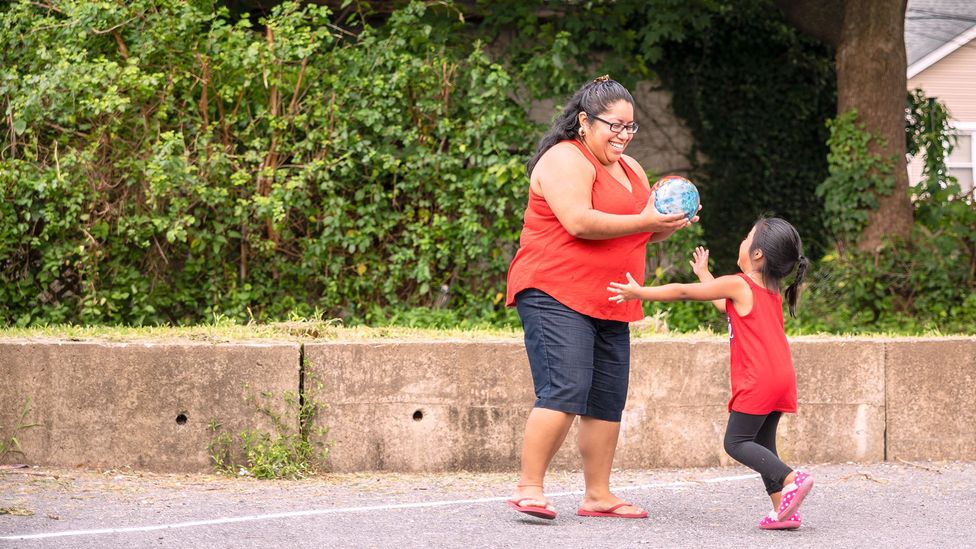Based on What You Read in Tongue Tied in What Way Did Kingston's Parents Most Likely Experience
What is the best historic period to learn a language?

When it comes to learning a foreign language, we tend to retrieve that children are the virtually practiced. Just that may non be the case – and there are added benefits to starting as an adult.
I
Information technology's a busy autumn morning at the Castilian Nursery, a bilingual nursery school in n London. Parents help their toddlers out of cycling helmets and jackets. Teachers greet the children with a caress and a chirpy "Buenos dias!". In the playground, a piffling girl asks for her hair to be bunched up into a "coleta" (Spanish for 'pigtail'), and then rolls a ball and shouts "Catch!" in English.
"At this age, children don't learn a language – they acquire it," says the school's director Carmen Rampersad. It seems to sum up the enviable effortlessness of the little polyglots effectually her. For many of the children, Spanish is a 3rd or fifty-fifty fourth linguistic communication. Mother tongues include Croatian, Hebrew, Korean and Dutch.
Compare this to the struggle of the average adult in a linguistic communication class, and it would be easy to conclude that it'due south best to start immature.
Only science offers a much more complex view of how our human relationship with languages evolves over a lifetime – and there is much to encourage late beginners.
You might besides like:
• Why slumber should be every student's priority
• The amazing fertility of the older mind
• Can you lose your native linguistic communication?
Broadly speaking, different life stages give us different advantages in language learning. As babies, nosotros have a improve ear for unlike sounds; as toddlers, we can pick up native accents with astonishing speed. As adults, nosotros have longer attention spans and crucial skills like literacy that allow us to continually expand our vocabulary, even in our own language.
And a wealth of factors across ageing – like social circumstances, pedagogy methods, and even love and friendship – can affect how many languages we speak and how well.

Young children are good at picking upward native accents – just dissimilar life stages bring different linguistic benefits (Credit: Getty)
"Non everything goes downhill with age," says Antonella Sorace, a professor of developmental linguistics and director of the Bilingualism Matters Centre at the Academy of Edinburgh.
She gives the case of what is known every bit 'explicit learning': studying a language in a classroom with a teacher explaining the rules. "Young children are very bad at explicit learning, because they don't have the cognitive control and the attention and memory capabilities," Sorace says. "Adults are much better at that. And so that can be something that improves with historic period."
A study past researchers in Israel constitute, for example, that adults were better at grasping an artificial language dominion and applying it to new words in a lab setting. The scientists compared three separate groups: 8-year-olds, 12-year-olds, and young adults. The adults scored higher than both younger groups, and the 12-twelvemonth-olds as well did better than the younger children.
This chimed with the results of a long-term study of nearly ii,000 Catalan-Spanish bilingual learners of English: the late starters caused the new linguistic communication faster than the younger starters.

Some researchers have plant that young adults have advantages over children when it comes to language learning (Credit: Getty)
The researchers in Israel suggested that their older participants may have benefited from skills that come up with maturity – similar more advanced problem-solving strategies – and greater linguistic experience. In other words, older learners tend to already know quite a lot nearly themselves and the world and can use this knowledge to process new information.
What young children excel at is learning implicitly: listening to native speakers and imitating them. But this type of learning requires a lot of time with native speakers. In 2016, the Bilingualism Matters Centre prepared an internal report on Mandarin lessons in primary schools for the Scottish government. They found that one hour a week of didactics did not make a meaningful difference to five-yr-olds. But fifty-fifty just i boosted half-hour, and the presence of a native speaker, helped the children grasp elements of Standard mandarin that are harder for adults, such every bit the tones.
Easy acquisition
Nosotros all get-go out equally natural linguists.

Fifty-fifty newborns cry with an accent, imitating the speech they heard while in the womb (Credit: Getty)
There is no question, Sorace says, that the early years are crucial for acquiring our own language. Studies of abandoned or isolated children have shown that if we practise non learn man speech early on, we cannot easily make upwards for this later.
But here is the surprise: that cut-off is non the same for strange language learning.
"The important matter to empathise is that age co-varies with many other things," says Danijela Trenkic, a psycholinguist at the University of York. Children'south lives are completely different from those of adults. And so when we compare the linguistic communication skills of children and adults, Trenkic says, "we're not comparing like with like".

When a family moves countries, the children often larn a language faster – only that may be because information technology'southward more necessary to their survival (Credit: Getty)
She gives the example of a family unit moving to a new country. Typically, children will learn the language much faster than their parents. Simply that may be because they hear information technology constantly at school, while their parents might be working alone. The children may also experience a greater sense of urgency since mastering the language is crucial to their social survival: making friends, being accepted, plumbing fixtures in. Their parents, on the other paw, are more than likely to be able to socialise with people who understand them, such equally beau immigrants.
"Creating the emotional bond is what makes y'all ameliorate at linguistic communication learning, in my view," says Trenkic.
Adults can of course also create that emotional bond, and not only through love or friendship with a native speaker. A 2013 study of British adults in an Italian beginners' course found that those who stuck with it were helped by bonding with the other students and the teacher.

Linguistic communication students who create a bond with other speakers are more likely to persevere (Credit: Getty)
"If you notice agreeing people, that makes it more than likely that y'all'll push button on with a language, and that you'll persevere," Trenkic says. "And that really is the primal. Y'all demand to spend years learning it. Unless there's a social motivation for it, it's actually difficult to sustain."
Earlier this year, a written report at MIT based on an online quiz of well-nigh 670,000 people institute that to achieve native-like knowledge of English language grammar, it is best to start by about 10 years old, after which that ability declines. However, the report also showed that we tin keep getting better at languages, including our own, over time. For example, we only fully master the grammer of our own linguistic communication by nigh 30. This adds to a previous, carve up online report that shows even native speakers acquire near one new discussion a day in their own language until center age.

Even native speakers larn about one new word a day in their own language until centre age (Credit: Getty)
Trenkic points out that the MIT study analysed something extremely specific – the ability to pass for a native speaker in terms of grammatical accuracy. To the average language student, that may non be all that relevant.
"People sometimes ask, what is the biggest advantage of foreign languages? Will I earn more than money? Will I be cleverer? Will I stay healthier? Simply actually, the biggest advantage of knowing foreign languages is being able to communicate with more people," she says.
Trenkic herself is originally from Serbia. She only became fluent in English language in her twenties, after she moved to the U.k.. She says she still makes grammatical mistakes, particularly when she is tired or stressed. "All the same, despite all that – and this is crucial – I can do amazing things in English," she later writes in an email. "I tin can bask the greatest literary works, I can produce meaningful and coherent texts of publishable quality."

To the average language student, what by studies have assessed – the power to pass for a native speaker in terms of grammar – may not exist all that relevant (Credit: Getty)
In fact, the MIT quiz classified her as a native English speaker.
At the Spanish Nursery, where the teachers are singing 'Cumpleanos feliz' and the book corner stocks The Gruffalo in Hebrew, the director herself turns out to be a tardily starter. Carmen Rampersad grew upward in Romania and just really mastered English when she moved abroad in her twenties. Her children absorbed Spanish at nursery.
Only perhaps the most audacious linguist is her husband. Originally from Trinidad, he learned Romanian from her family, who live close to the border with Moldova.
"His Romanian is excellent," she says. "He speaks information technology with a Moldavian emphasis. Information technology'due south hilarious."
Join 800,000+ Time to come fans past liking united states on Facebook , or follow us on Twitter .
If you liked this story, sign up for the weekly bbc.com features newsletter , chosen "If You Only Read half dozen Things This Calendar week". A handpicked selection of stories from BBC Futurity, Civilization, Upper-case letter, and Travel, delivered to your inbox every Friday.
Source: https://www.bbc.com/future/article/20181024-the-best-age-to-learn-a-foreign-language
0 Response to "Based on What You Read in Tongue Tied in What Way Did Kingston's Parents Most Likely Experience"
Post a Comment